How do I price my writing services?
A lot of freelance writers wonder how to price their writing services, so I’m going some ways to do so in this article.
Adam Woodard
4 min read


If you’re a freelancer, you’ve likely wondered how to price your writing services. More experienced freelancers probably have a better idea of how much they want to charge and are comfortable negotiating with clients, but for those who’re just starting or relatively new, this can be quite confusing and a little daunting. If you’re in the latter category, read on and I’ll explain some ways to navigate this.
Broadly speaking, you can either go off your own standards or those of others. You can also mix both. If you’re already irritated because the reason you’re reading this article is because you’re trying to develop your own standards, don’t worry.
The mental exercise approach
To develop some initial standards or expectations of your own, perform a simple mental exercise. Imagine someone is asking you a series of questions about whether you’d be willing to do a piece of work for a particular project. If you don’t yet have a project, let’s just assume you’ve been asked to produce a thousand-word article on a subject that you know.
Your imaginary questioner asks you:
‘Would you write the article for one dollar/pound/euro?’
The answer is probably no. This is a start.
‘Would you write it for two dollars/pounds/euros?’
Probably quite low again. Repeat the exercise in small increments until you think, ‘Yeah, that’s about the minimum I’d be OK with.’ Next, round it up by 20%. That’s your starting point when talking to a prospective client. So, if for example you’ve decided that you’re not comfortable writing it for less than £20, then your opening bid is for £24. Simple. If the client tries to haggle, you’ve got £4 (20%) to play with.
Remember that this is just a starting point, and after getting some feedback from clients on your rates you can adjust accordingly. Over time, you’ll develop a feel for the quality you offer and the value this provides for clients. Does it require extra research? Add another 20%. Does the client want more than three revisions? Round up again.
Do some research
Now we can turn to other people’s expectations, which is typically a good idea for a freelancer. This is easier if you’re on a freelancing platform where you can see what clients are expecting and others charging. Otherwise, look for rates on a search engine as if you were a client looking locally. Do your research and compare the rates you encounter with the minimum you calculated. Are they close? If so, you’re probably doing alright. If you want to win clients and there’s lots of competition, maybe round it down a little.
You may discover that you’re undercharging or overcharging, enabling you to adjust. Between these two methods, you can generate a workable range. Go for the lower end if you’re still trying to get clients and the upper end if you’re attracting them easily.
Next, we can talk about hours. Aside from being another way of charging, this can also help you decide if a job is worth it. Keep in mind that the goal is to develop an innate sense of whether a project is worth your time. Even if you’re beginning as a writer, you likely have an idea of how many words you can write in an hour. This isn’t just about typing speed, but the rate at which you can convey whatever the message is, plus research and proofreading. If you’re unsure, set yourself some tasks like writing a blog, and find out how much you can do in an hour.
For instance, if you estimate that 500 words per hour is workable, then you know that a thousand-word article is at least a two-hour job. You can factor this into your internal questions:
‘Am I willing to dedicate two hours of my life for £24?’
Given that’s around minimum wage (as of 2023/2024) in the UK, you’ve got some context. From experience, if you’re just starting out as a writer with a limited portfolio, that’s not too bad. Remember that clients from other parts of the world have their own expectations about fair pricing, so keep this in mind.
Beyond getting started
Ultimately, your initial rate is just that: a starting point. Don’t worry too much about it, as you’ll learn over time and develop a sense of what fair pricing is. You don’t have to take every job if it isn’t necessary, but it’s also worth bearing in mind that getting started may mean taking some low-paying work until you build up a portfolio.
Lastly, don’t be afraid to reach out to writers, editors, proofreaders, and others who have some experience. They’ll likely recognise that you’re going through something they already did and will be happy to offer feedback and advice. That being said, being a freelancer can be difficult, so don’t take it the wrong way if they can’t spare the time, especially if you’re looking for something more involved like a mentor. Also, some just aren’t that active on social media (I’m guilty of this) and may miss messages entirely. Online forums (yes 'forums', not fora) on platforms like Reddit are another way to connect with others and get their feedback – just take it with a pinch of salt!


